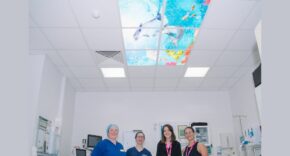
Almost a fifth (17%) of UK patients have turned away from face-to-face appointments as their preferred method for accessing medical advice and treatment, as trust in modern technologies grows, according to new research from Nuance.
The global study – which polled 10,000 adults across the US, UK, Australia, Germany, France, Belgium, the Netherlands, Sweden, Italy, Spain and Mexico – found that before the COVID-19 pandemic, the vast majority of UK patients (64%) preferred to receive their medical advice in-person. Very few would have selected phone (16%) and video (4%) consultations as an alternative.
However, over the course of the pandemic, the National Health Service (NHS) was forced to transform the way that it delivered patient services. Digital appointments quickly became a part of everyday life for patients, and this led to fundamental shifts in both behaviour and attitude.
As restrictions ease and wider healthcare services resume, less than half (47%) of UK patients would choose to rely solely on face-to-face appointments. In fact, the poll revealed that 47% of respondents are now comfortable with receiving medical services remotely, with 15% feeling ‘very comfortable’.
In this new landscape, phone appointments, video appointments and a mixture of these alongside in-person visits are preferred by two fifths (40%) of respondents. When asked why this was the case, almost half (46%) cited no travel. This was closely followed by the ability to reduce the pressure on health service resources (36%) and speed up the time it takes to access treatment (35%).
Embracing modern technologies to ease the documentation burden
In addition to being more comfortable with accessing healthcare services remotely, many UK patients have also become increasingly open to the use of modern technologies – such as artificial intelligence (AI) – over the course of the pandemic.
In fact two thirds (60%) would now be open to its use to produce clinical documentation, instead of relying on hand-written notes by their doctor. When asked why they were open to the use of AI, nearly three quarters (71%) highlighted the potential to speed up appointments. 50% said they believed it would help their doctor focus on the diagnosis, while almost a third (32%) felt it would lead to more accurate and detailed medical information. The speed at which these patients have become comfortable with this significant shift in healthcare delivery points towards where the industry is heading.
Quality patient care depends upon detailed and accurate clinical documentation. By enabling medical professionals to compile records using just their voice, AI-powered technologies recognise and record long passages of speech, capturing the complete patient story at the point of care, whilst reducing repetition and supporting standardisation across departments. Given that humans speak at least three times faster than we type, integrating these types of technologies will free up clinicians’ time so they can spend more time seeing patients and delivering quality care.
“Over the course of the global pandemic, the NHS was forced to radically transform the way that it delivered its life-saving services. The new digital practices that emerged from this time of chaos have resulted in long-term changes to patient expectations and preferences,” said Simon Wallace, Chief Clinical Information Officer at Nuance Communications. “The industry has evolved and this research indicates that there is no going back.”
“Patients have seen the benefits of smarter, tech-enabled services and, as a result, trust in AI-powered solutions to support healthcare delivery is at an all-time-high. Harnessing these solutions, could drastically reduce the clinical documentation burden many clinicians face, meaning time savings for patients and less strain on medical resources. Moving forward modern technologies are set to play a key role in enabling healthcare organisations to meet patient expectations and continue to drive better experiences for both patients and clinicians.”












